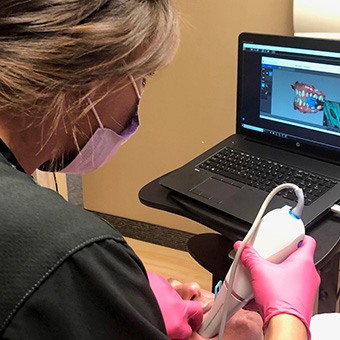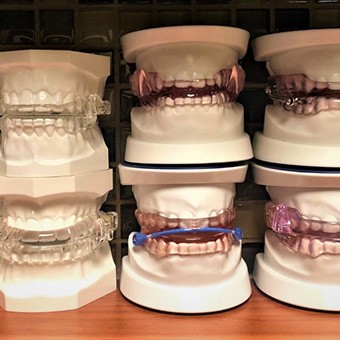Obstructive Sleep Apnea – Powell, OH
Freeing Up Your Airway So You Can Breathe Better
At Powell Dental Group Sleep Solutions, Dr. Shults and our team of professionals are equipped to treat obstructive sleep apnea (OSA) so that patients can breathe freely without fear of airway obstruction. With millions of people in the United States suffering from this same problem, it’s imperative that timely and effective treatment be provided. If you desire a full night of uninterrupted sleep and want to feel refreshed when you wake up, call our office to schedule an appointment today.
Why Choose Powell Dental Group Sleep Solutions for Obstructive Sleep Apnea Treatment?
- Shults is a Quadruple Board-Certified Doctor
- Multiple Sleep Apnea Treatment Options Available
- Practice is In-Network with UnitedHealthcare Medical Insurance
What Causes Obstructive Sleep Apnea?

Obstructive sleep apnea (OSA) is a condition that forms when the soft oral tissues of the mouth collapse onto the throat, resulting in a blocked airway. This causes breathing to stop, resulting in patients waking up suddenly and often gasping for air. This can happen once or hundreds of times each night, eventually leading to chronic fatigue and more serious overall health problems.
There are many reasons why OSA can develop; however, some of the most common include being overweight or obese, having a narrow throat, or living with oral abnormalities that often get in the way of the airway while you sleep (i.e., enlarged tonsils).
Other potential causes include:
- Smoking
- Excessive alcohol consumption
- A recessed jaw
- Using sedatives
Possible Complications of OSA

Receiving timely treatment for OSA is crucial if you want to avoid the development of more serious health-related conditions. Countless research suggests that untreated OSA can lead to:
- Slower reaction times when driving because of drowsiness
- Moodiness and sexual dysfunction
- Heart attacks, strokes, or other cardiovascular diseases
- Unnecessary weight gain that can cause OSA symptoms to worsen
- Chronic fatigue
- High blood pressure
- Bedwetting
When Should I See a Doctor?

You may not know right away whether you should see a doctor for your OSA. This can often be harder if you live alone, especially since you cannot necessarily observe how you sleep each night. This is why it’s important to recognize the signs. If you begin to develop any of the symptoms listed above, do not wait any longer to seek treatment. Our team at Powell Dental Group Sleep Solutions will meet with you for a consultation and design a plan that works for you.
But before that can happen, you should plan to contact our office if:
- Others complain of your loud, persistent snoring
- You wake up frequently gasping for air or choking
- You or someone notices that you stop breathing at night
- Daytime fatigue is a daily occurrence, and it is affecting your ability to drive and get work done
Types of Treatment for Obstructive Sleep Apnea

Dr. Shults and our team offer several different treatment options for OSA. Depending on your unique needs, we will create a plan that targets the problem and helps to alleviate symptoms so that you can enjoy more quality sleep and a better quality of life.
PAP Therapy
PAP (positive airway pressure) therapy is the most common form of treatment for OSA and is more commonly referred to as CPAP. You will wear either a nasal or face mask while a machine pushes pressurized air into your airway so that it remains open and unobstructed at night. This is most commonly recommended for patients with serious cases of OSA.
Oral Appliance Therapy
If your OSA symptoms are mild, you may find relief with oral appliance therapy (OAT). Customized based on your unique needs, this type of device pushes the lower jaw forward so that your tongue and throat muscles do not collapse onto your airway. Not only is it portable and easy to wear, but it is comfortable and requires no additional equipment.
Airway Surgery
In the most extreme cases, our team may recommend airway surgery. If traditional OSA treatments are unsuccessful, we can perform a DISE (drug-induced sleep endoscopy) procedure that collects necessary information to determine which surgical method is best, such as:
- A UPPP (uvulopalatopharyngoplasty) – This procedure treats moderate to severe OSA by removing excess tissue in the throat so that the airway becomes wider.
- Hyoid Stabilization – This procedure is designed to stabilize the tongue base (the hyoid bone) and epiglottis. It can also be performed to reduce the size of your tongue if necessary.
- Skeletal Surgical Procedures – Repositioning the upper and lower jaw can be helpful to ensure that the airway remains open; however, it does require a longer recovery time.
